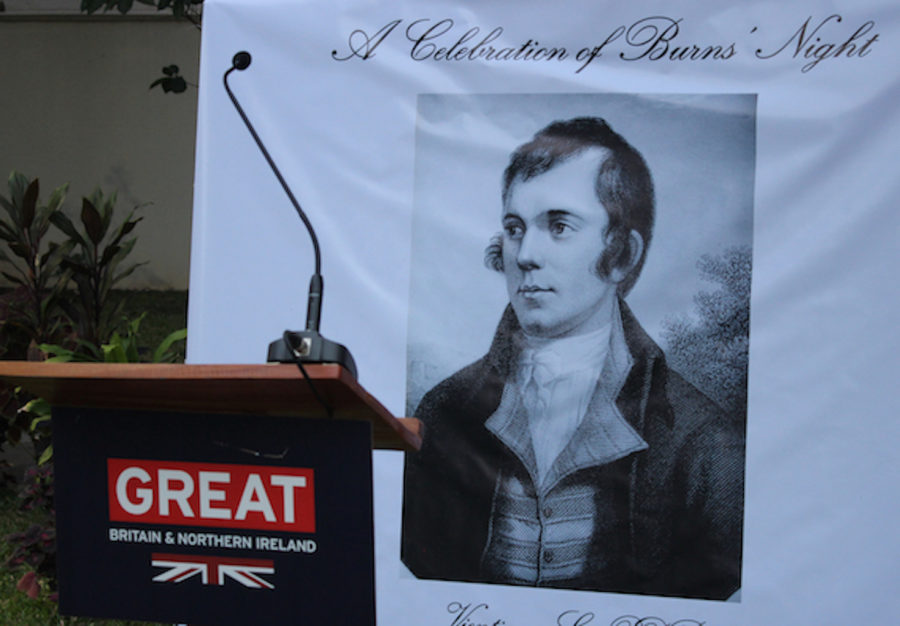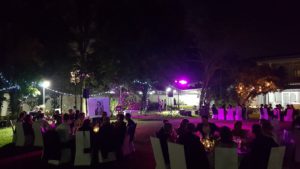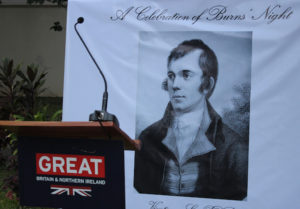9th February 2017 Vientiane, Laos
“Dare to be Honest and Fear no Labour” (Robert Burns)

I was recently delighted to host my first Burns Supper in Vientiane. It was a wonderful evening of poetry, food and dance for which the organizational credit must go to Scottish community stalwart, Clare Hepburn, ably supported by her husband Alistair and others. As someone who grew up in the southern Scottish town of Dumfries. where Burns spent his final years, I was honoured to give the toast to “the immortal memory” of Robert Burns – traditionally a personal tribute to the life and works of Scotland’s foremost poet.

Preparing my remarks for the occasion reminded me of the transformative impact of education – and the powerful influence of family. Burns was the eldest of seven children and the son of a poor tenant farmer. His father could not afford to send his children to school. But he insisted on teaching Burns and his siblings to read and write. The family also eked out its meager savings to hire a personal tutor to instruct them in Latin, French and mathematics.
The experience instilled in Burns a love of learning and creative expression that shaped his tragically short life (1759-1796). The result was a treasure trove of poetry, songs and other writings, much of it about the daily struggles of working men and women, that not only helps define Scottish identity but continues to inspire people around the world, including Bob Dylan, the iconic recipient of last year’s Nobel Prize for Literature.

Few of us who value learning can aspire to match Burns’ extraordinary legacy. But for countless individuals, myself included, education has similarly broadened our minds. It has also changed our lives by enabling us to access opportunities unavailable to earlier generations (my grandfather, a coal miner for 50 years, was passionate that all his grandchildren should attend university – sadly, he didn’t live quite long enough to see me go). What makes the pursuit of education all the more remarkable is that its transformative effects cross borders, potentially benefitting everyone, irrespective of ethnicity, class or gender.
Of course, the ease with which people in different countries can access education still varies enormously. In Laos, the government has made an impressive start in widening opportunities for its citizens. Over 20 years, it has substantially reduced illiteracy; achieved near universal primary school enrolment and – from the foundation of the National University of Laos (NUOL) in the mid 1990s – created a higher education sector from scratch. With much more to do, the government has also made clear it positively welcomes international support in continuing to build a comprehensive education system.
It’s what has prompted us as an Embassy to make education a central component of our medium term Creative Partnership strategy – and why we have worked hard to forge a close relationship with Madame Minister Sengduane Lachantaboun and her colleagues in the Ministry of Education and Sports.

As a small Mission, we have targeted our limited resources on three priorities: advertising the benefits of studying in the UK, including seeking to expand our Chevening postgraduate scholarships; promoting bilateral university links (such as Aston University’s comprehensive MOU with the NUOL); and – in response to a host request – aiming to support government policy in embedding English as the country’s main foreign language. We have two British Council consultancies currently examining English language training needs in the public service and school system respectively. I will update on the progress of these initiatives in a future blog.
But the role of a government – or indeed an embassy – can only ever be part of any educational story. It’s individual effort and interest that really drives successful outcomes. With apologies to the great American inventor Thomas Edison, my view is that educational excellence, like genius, is also “1% inspiration and 99% perspiration”.
In seeking examples in Laos that embody this determination, I don’t have to look far. Some of my own staff have won highly competitive scholarships to study in other countries and all have made best use of the educational resources available. My secretary, for example, is largely self-taught in English from watching films, speaking with friends, and ruthlessly practising her reading and writing skills at home. She more than holds her own in an English speaking Embassy. It’s one of many reasons why I am proud of her and the rest of my amazing team.
And, as in Burns’ time, it’s clear that family support remains a wellspring of educational dreams in Laos as much as elsewhere. Only the other day, a taxi driver was telling me about his daughter’s ambitions to go to university – she would be the first from his family if she secures a place. Ideally, she would also like to study abroad and he had been paying for her to have private English language tuition for several years. It had been a big financial commitment. But he himself was more than happy to continue working seven days a week to get her on to the kind of professional path not open to him when he was a young man. My grandfather would have understood.
Let me end, though, as I began – with Burns. Though he was well educated and familiar with the classics of English literature, he never forgot his roots. He wrote primarily (but not exclusively) in a Scots version of English, not just because he was more comfortable using this medium of expression but because he cherished – and wanted to project – his own culture. And while promoting the use of English is a core part of my own mission in Laos, I never forget this country has its own fascinating languages and cultures, too. It’s a privilege to be learning Lao and I am eager to know more about the Lao literary tradition, so if anyone has suggestions on sources I should consult, please do let me know. And one day, I hope to persuade at least one UK university to offer Lao language as one of its courses.
Dear, Ambassador Evans.
A very enjoyable blog!
“Will” would have approved being followed by “Rabbie”.
I hope this UK arrival and departure date guide can inspire one or more future blogs: http://www.bornglorious.com/birthday/?ct=/m/07ssc&pd=today